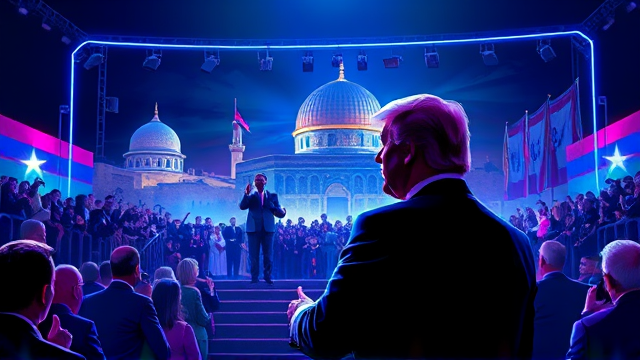Trump's Foreign Acclaim Contrasts with Domestic Troubles
The political theater unfolding for Donald Trump presents a study in stark duality, a phenomenon not entirely without precedent in the annals of American statecraft, yet one whose contours are uniquely defined by the polarizing nature of his political career. In Jerusalem, the former president was met with the kind of statesman's reception that has so frequently eluded him on native soil—a chorus of ovations and gushing praise from foreign dignitaries that stood in jarring contrast to the cacophony of domestic troubles besieging his potential return to power.This divergence between international acclaim and domestic tribulation is reminiscent of historical figures who found a more receptive audience abroad than at home, though such parallels must be drawn with caution. A deeper analysis reveals that the accolades in Israel were strategically situated within a specific geopolitical alignment, rewarding a foreign policy record that included the controversial relocation of the U.S. embassy and a hardline stance against Iran, actions that resonate profoundly with certain allied governments while simultaneously deepening fissures within the American electorate and foreign policy establishment.Meanwhile, back in the United States, his administration-in-waiting grapples with a relentless string of judicial and legislative challenges, from a cascade of indictments weaving a complex legal web across multiple jurisdictions to intense congressional scrutiny and a primary electorate that, while still largely loyal, is navigating a political landscape reshaped by these very entanglements. This domestic front is not merely a backdrop but an active battlefield where every judicial motion and congressional hearing is dissected with partisan fervor, influencing fundraising, polling dynamics, and the strategic calculus of his campaign.The chasm between the two stages—the revered statesman abroad and the embattled figure at home—speaks volumes about the global perception of American power and the internal schisms that currently define its politics. It raises profound questions about the durability of such foreign support in the face of sustained domestic legal pressure and whether this international validation can be effectively leveraged as a political asset to counterbalance the narratives of instability and scandal that dominate the home front. As Churchill once navigated the perilous gap between his wartime leadership and a peacetime political reckoning, so too does Trump's current trajectory suggest a political fate that will be determined by which narrative—the internationally celebrated leader or the domestically besieged contender—ultimately captures the definitive judgment of history and, more immediately, the American voter.
Latest News
In a seismic political maneuver that has sent shockwaves through the corridors of European power, French Prime Minister Gabriel Attal has formally proposed the
44 minutes ago0 comments
On a day that should have been defined by the simple peace of a coffee break, a teenager known only as ‘Arda K’ waded into an open-air cafe in Eskisehir,
52 minutes ago0 comments
The impending Pentagon defense strategy report, a document anticipated with profound gravity within global diplomatic and military circles, signals a tectonic
1 hour ago0 comments
In a development that recalls the careful diplomatic positioning of historical statecraft, Prime Minister Keir Starmer has publicly acknowledged the
1 hour ago0 comments
The viral hot-mic moment in which Indonesian President Prabowo Subianto was heard asking US President Donald Trump if he could meet his son Eric shortly after
2 hours ago1 comments
In a strategic maneuver that reads like a contingency plan ripped from a geopolitical risk assessment, China is reportedly training its soldiers to function as
2 hours ago0 comments
The exclusion of women from a Muslim charity run in London’s Victoria Park, organized by the East London Mosque and London Muslim Centre, has ignited a
3 hours ago0 comments
In a political maneuver that felt more like a campaign rally than a parliamentary statement, Keir Starmer took to the Commons floor today with a declaration
3 hours ago1 comments
It’s quiet here...Start the conversation by leaving the first comment.
